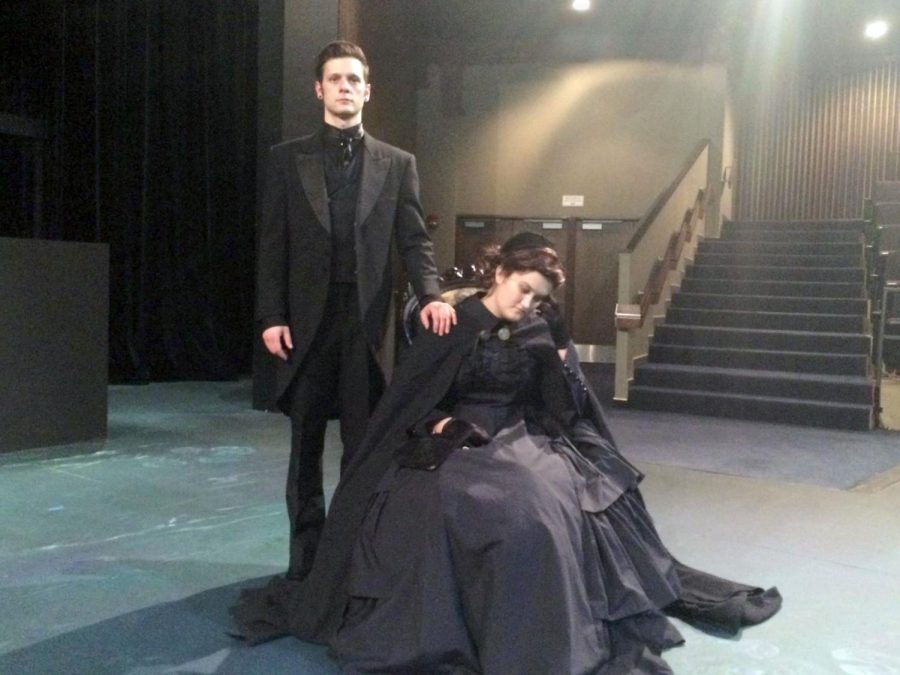‘The Turn of the Screw’ haunts audiences
September 8, 2016
The gothic genre is a treasure trove of true horror.
This past June, Washburn premiered its summer and fall production of “The Turn of the Screw,” a drama by playwright Henry James based in the late 19th century. The drama follows a young governess recently employed by a wealthy London businessman. He sends the governess to care for his neice and nephew in the countryside in near total isolation. As the governess gets to know her seemingly innocent wards, she begins experiencing ghostly hauntings.
“The Turn of the Screw,” is traditionally a two-person ensemble, and Washburn honored that challenge. Jamie Schartz, senior, played the role of the governess, a naive, romantic young woman who tries to see the best in people. Andrew Fletcher, senior, co-stars in not one, but four roles as the governess’s employer, the housekeeper, a ghost and Miles, one of the children. These two did a great job with a challenging script. They make a solid and wicked team, feeding off one another’s energy scene-to-scene as tensions rise. Particular kudos for the two nailing their old English accents. There is little worse than a cheesy British accent, and Schartz and Fletcher thankfully spared us all from that.
Fletcher in particular had the challenging task of portraying four distinct characters of various gender and age, as well as pantomiming the mute child Flora. His portrayal of Miles is nothing short of unnerving. The script calls for a child whom is well-mannered and cheeky, but has seriously sinister subtext. It would have been so easy to overplay that type of role, but Fletcher struck a nuanced balance between childlike and villainous. Fletcher’s portrayal of the housekeeper is only seen in small doses, and is meant to be the voice of reason. By adopting a hunched over stance and a slightly thicker and more feminine accent, he did a nice job differentiating the elderly woman from his male characters.
Fletcher also brings to life a villainous ghost. While he has no lines, the calculated body language keeps the mood on stage suspenseful and dangerous. The character of the governess’s employer was only on stage for a short time, but was not without its challenges either, as much of Fletcher’s lines here were delivered in quick, stichomythic bursts between himself and the governess.
While Fletcher’s challenge was juggling multiple personas, Schartz’s task was to transform her character of the governess from sweet and idealistic, to someone tormented by the secrets surrounding the old house and the supernatural. It’s a purposefully slow progression, as we see her initially believing the children are perfect angels and eventually come to suspect that they are working against her with malevolent ghosts. Schartz’s portrayal of a woman becoming unhinged is nothing short of stellar.
The set design and technical aspects of the show were well put together as well. The set is made up of three levels, a turret, a few staircases and a lone chair to demonstrate both how large and claustrophobic the country estate is. The sound mixing, too, was well done. When ambient music was necessary, it blended well with the scene, while other times the production relied upon Fletcher to add sound effects, such as saying “creek” or “footsteps” forebodingly in the background. Probably my favorite technical aspect of the production, though, were the costumes. The team outdid themselves with Schartz’s grimly gorgeous gothic gown and Fletcher’s historically accurate suit.
I urge everyone to check out this production of “The Turn of the Screw.” It’s dark, has a dry sense of humor and has two leads with a lot of talent and on-stage chemistry.
“The Turn of the Screw” will be showing in the Neese Gray Theatre 7:30 p.m., Sept. 8, 9 & 10, and 2 p.m. Sept. 11. Free admission with Washburn student or faculty ID.
Rating: 5/5 stars



